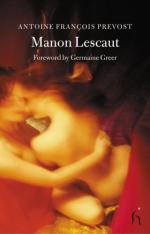“I thus passed six long months; during the first of which my mind underwent little change. My feelings were in a state of perpetual alternation between hate and love; between hope and despair; according as, the tendency of each passing thought brought Manon back to my recollection. At one time, I could see in her the most delightful of women only, and sigh for the pleasure of beholding her once more; at another, I felt she was the most unworthy and perfidious of mistresses, and I would on these occasions swear never again to seek her, but for the purpose of revenge.
“I was supplied with books, which served to restore my peace of mind. I read once again all my favourite authors; and I became acquainted with new ones. All my former taste for study was revived. You will see of what use this was to me in the sequel. The light I had already derived from love, enabled me to comprehend many passages in Horace and Virgil which had before appeared obscure. I wrote an amatory commentary upon the fourth book of the AEneid. I intend one day to publish it, and I flatter myself it will be popular.
“`Alas!’ I used to exclaim, whilst employed on that work, it was for a heart like mine the faithful Dido sighed, and sighed in vain!’
IV
Now, by the strange enchantment that surrounds thee,
There’s nothing—nothing thou shalt
ask in vain.
Essex.
“While in my confinement Tiberge came one day to see me. I was surprised at the affectionate joy with which he saluted me. I had never, hitherto, observed any peculiar warmth in his friendship that could lead me to look upon it as anything more than the partiality common among boys of the same age. He was so altered, and had grown so manly during the five or six months since I had last seen him, that his expressive features and his manner of addressing me inspired me with a feeling of respect. He spoke more in the character of a mentor than a schoolfellow, lamented the delusion into which I had fallen, congratulated me on my reformation, which he believed was now sincere, and ended by exhorting me to profit by my youthful error, and open my eyes to the vanity of worldly pleasures. I looked at him with some astonishment, which he at once perceived.
“`My dear chevalier,’ said he to me, `you shall hear nothing but the strict truth, of which I have assured myself by the most serious examination. I had, perhaps, as strong an inclination for pleasure as you, but Heaven had at the same time, in its mercy, blessed me with a taste for virtue. I exercised my reason in comparing the consequences of the one with those of the other, and the divine aid was graciously vouchsafed to my reflections. I conceived for the world a contempt which nothing can equal. Can you guess what it is retains me in it now,’ he added, `and that prevents me from embracing a life of solitude? Simply the sincere friendship I




